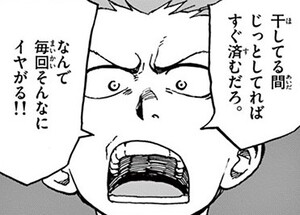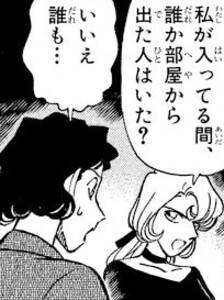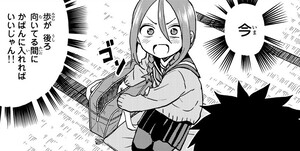During the same time with 〜間(に)
Grammar: Time and Sequence » 〜間に
間(に) joins two clauses to state that the second (main) clause takes place at the same time as the first (subordinate) clause.
The clauses may have different subjects.
間 may attach to a noun, adjective, or verb. The verb before 間 is normally non-past 〜て+いる or いる.
When two clauses are joined by 間, they typically cover the same span of time. When に follows 間, the main clause occurs within the same time as the subordinate clause.
English counterparts are “during (the time when)” and “while”.
Related Grammar
- Concurrent events with ながら
- During with うちに
- Used when refering to a period of time, especially when taking advantage of an opportunity.
- While with うちは
- Used when contrasting with another period of time.
Examples
Keeping still while her ribbon dries with 〜間

Kyouko’s ribbon needs to be washed. Since she is a jiāngshī (vampire), she will uncontrollably attack people to drink their blood when her ribbon is removed. For this reason, her brother tries to tie her up with a rope. Kyouko hides in the bathroom, then sneaks out the window only to find Kenji waiting outside.
- ケンジ:
- 「干してる間じっとしてればすぐ済むだろ。」
- “Whileit's drying, if you'd just keep still it'd be over soon.”
- ケンジ:
- 「なんで毎回そんなにイヤがる!!」
- “Why do you seem to hate it so much every time?!”
Here, 間 marks an exact overlap between the events of Kyouko’s ribbon drying and her keeping still.
Leaving the room while Yukiko was out with 〜間

A murder victim was last heard from via phone call at 9PM. Her body was found outside later that night. Yukiko was in the main room with everyone except when she was bathing.
- 有希子:
- 「私が入ってる間、誰か部屋から出た人はいた?」
- “While I was in the bath, was there anyone who left the room?”
- 広美:
- 「いいえ誰も…」
- “No, no one...”
Here, 間 marks an exact overlap between the events of Yukiko bathing and someone leaving the room.
Placing the chocolate while his back is turned with 〜間に

Urushi prepared chocolate to give Ayumu for Valentine’s Day but is too nervous to give it to him. After the two play shogi during their club, Ayumu turns away from Urushi as he puts the shogi table away.
- うるし:
- 「今。歩が 後ろ向いてる間にかばんに入れればいいじゃん!!」
- “Now! WhileAyumu's back is turned, I can put it into his satchel!”
Here, 間に marks an inclusive overlap, where the moment Urushi places the chocolate in Ayumu’s satchel takes place during the span of time when Ayumu’s back is turned toward her.